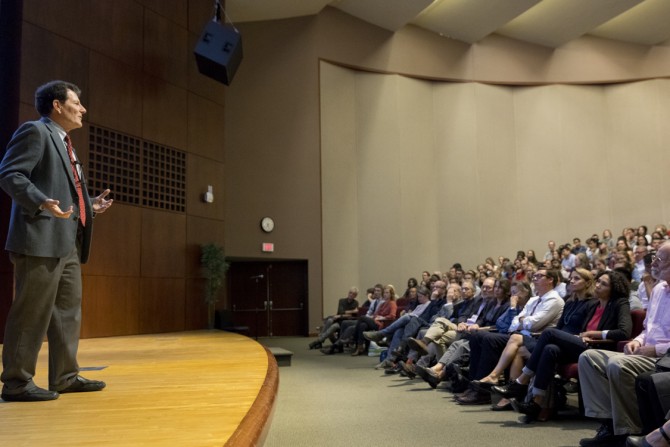NY Times’ Nicholas Kristof talks inequality, empathy, children
By Stephen D'Angelo
To celebrate the 100th anniversary of the birth of Cornell developmental psychologist Urie Bronfenbrenner and his contributions to child well-being, the Bronfenbrenner Center for Translational Research welcomed Pulitzer Prize-winning journalist Nicholas Kristof of The New York Times to deliver the Urie Bronfenbrenner Centennial Lecture Oct. 2.
“Nicolas Kristof’s work links so well with Urie’s in his passion for uncovering the truth, and for creating a better world for children and for all human beings. He’s a powerful public advocate for the poor and vulnerable and oppressed,” said Karl Pillemer, director of the Bronfenbrenner Center for Translational Research and the College of Human Ecology’s Hazel E. Reed Professor in the Department of Human Development, in his introductory remarks.
Kristof’s talk, to an almost 600-person crowd in Call Auditorium, drew on his work promoting gender equality around the world and on public health and poverty with a focus on children.
“I think one reason why we haven’t been effective at addressing inequality is that we often start too late, and the roots of inequality are often very early in life,” he said. “Inequality of opportunity is maybe the most fundamental inequality of all.”
He continued, “There actually is a certain amount of agreement in principle that we should do more to address that, in one poll, 97 percent of Americans agree that there should be greater equality for children at a starting point.”
From reporting on inequality in education for girls in China to sexual slavery in Cambodia, Kristof painted a picture of young people across the globe and in the United States who are being left behind. He said translational research will lead to better outcomes for these populations.
“There has been more and more scholarship looking at this issue, at the roots of inequality the impact of early childhood, even prenatal experiences on lifetime outcomes,” Kristof said. “I think that the traditional view is that children are endlessly resilient, and it’s clear that that is not the case.”
As one example, he said programs that coach underprivileged mothers on basic care can have long-lasting impacts on infants. Women taught the importance of avoiding alcohol and drugs, managing anger when frustrated with a child, and what to do if a husband or boyfriend is mentally or physically abusing their child have a massive impact on future graduation rates, teen pregnancy, and drug and alcohol use among their children.
Further, Kristof pointed to family planning and education programs as profoundly effective for young women and children, compared with programs focused on promoting marriage and a traditional faculty structure.
“As far as we can tell, American kids and European kids have sex at about the same rates, based on self-reporting surveys, and yet American girls get pregnant and have babies three times as often,” Kristof said. “This seems to be because American kids don’t have as good access to comprehensive sex education and access to reliable forms of birth control.”
Overall, he said, girls who have this education are not only empowered but more likely to stay in school, to go to college and to do well in their adult and family lives.
“Increasingly, we do have an evidence base and randomized control trials that give us a sense of what works and what creates opportunities,” Kristof said. “Something that always puzzles me is that we have what works at what cost, yet we don’t apply that knowledge.” He pointed to the “empathy gap” – which leads wealthier Americans to be less engaged in many social issues compared with those who are poorer – as a partial culprit.
“There is no doubt that poverty sometimes involves self-destructive behavior that compounds poverty,” he said. “But we have to talk about our collective responsibility to address these issues, and that’s where I believe we have a collective failing when we have so many impoverished kids in this country.”
Kristof concluded, “If we can bridge that empathy gap more often and bring in evidenced-based policies that create opportunity, then we can create a very different kind of America.”
Stephen D'Angelo is assistant director of communications for the College of Human Ecology.
Media Contact
Get Cornell news delivered right to your inbox.
Subscribe